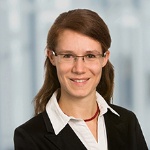Project partner
Background
Today's manufacturing plants are complex, large-scale systems that can be developed faster and with higher quality using virtual commissioning. This requires time-deterministic hardware-in-the-loop simulations that are connected to the control system instead of the real machines. The material flow, which describes the movement of individual piece goods within a production plant, is a particularly computationally intensive element of the simulation models.
Problem statement
In preliminary work, a macroscopic flow model based on hyperbolic partial differential equations was developed, whose computation time is independent of the number of simulated piece goods and thus can also simulate plants with a high number of piece goods. This is made possible by modeling the piece goods as a density distribution ρ. The environment is represented as a static velocity field and the interaction of the elements as a dynamic velocity field. However, the applications of the flow model are still very limited and the consideration of specific piece goods is not possible.
In this project, the scope of the flow model will be extended to represent different environmental geometries, goods, sources and sinks. To achieve this goal, new real-world data with more variations are needed. To this end, a real-world demonstrator will be designed and built to collect data that will be used to validate the flow model in additional scenarios. The data will also be used to improve the parameterization of the flow model so that it can be easily configured for different scenarios. Since details and specific unit loads cannot be represented in the flow model, it will be combined with a physics-based model to create a multi-scale network model. In this multi-scale network model, it should be possible to switch between the model types.
Goal
In order to fully represent the material flow in a production plant, a multi-scale network model is to be created in which it is possible to switch between the flow model and the physics-based model. The overall goal of the project is to simulate material flow-intensive plants with varying levels of detail and configuration in real time. This will allow better design and optimization of control systems.
Get in touch

Annika Kienzlen
M.Sc.Research Assistant "Virtual Methods for Production Engineering"



